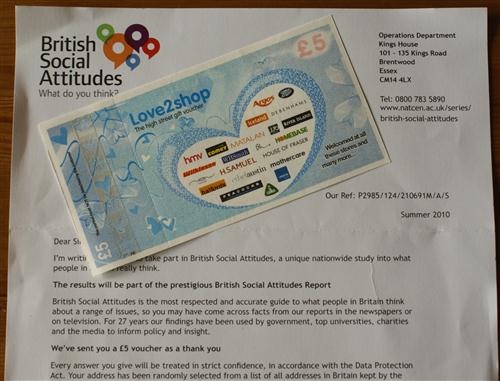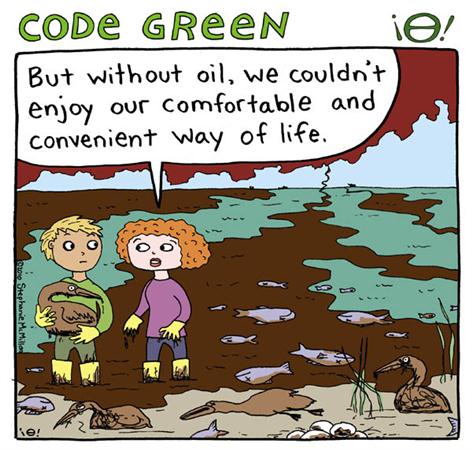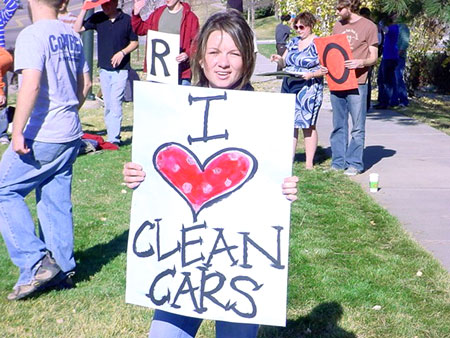Taking a cue from all the awards and “looking back on”s going on at the moment, it seems like just the right time to pick the very worst ethical hypocrites of 2010. Taking the year as a whole, there is a huge selection to choose from even when just looking at the pages of The Unsuitablog; and that’s going to be the focus – I could reach out to other places but I think that just throwing a few darts at a board of corporate logos is far less instructive than looking into the dark recesses of near history and seeing what can be pulled out of the grime for a further airing.
Best of all, it gives me the chance to have one more pop at those offenders who really deserve a second go at.
Worst Large Company
Lockheed Martin would deserve this award for merely having the word “responsible” anywhere on their website, but as we found out in June, it seemed that one of the largest arms manufacturers in the world had undergone a complete logic transplant.
LOCKHEED MARTIN ANNOUNCES NEW GREEN INITIATIVES FOR 140,000 EMPLOYEES, THEIR FAMILIES AND COMMUNITIES
BETHESDA, Md. – Lockheed Martin (NYSE: LMT) today announced new green initiatives to reach its 140,000 employees, their families and communities. The orchestrated effort is rolling out in conjunction with National Environmental Education Week (EE Week), the largest organized environmental education event in the United States.
Held each year during the week before Earth Day, EE Week coordinates environmental education outreach nationwide to increase Earth Day’s impact. Lockheed Martin will celebrate EE Week and Earth Day by introducing several new company-wide employee initiatives to encourage environmentally-friendly behavior at work, at home and in local communities.
“At Lockheed Martin, it is our goal to raise awareness of natural resource conservation and to help our employees take an active role in their communities,” said Dr. David J.C. Constable, vice president, Lockheed Martin Energy, Environment, Safety & Health. “With the reach of our organization’s network, we have the opportunity to inspire hundreds of thousands of individuals – starting with our employees, their families and communities – so that as a corporation, we can make a big impact one small action at a time.”
The only response I could make was a video spoof, which still hasn’t been seen enough. It seems like a suitable enough prize for this video to be posted as far and wide as possible.
http://www.youtube.com/watch?v=uRfGzFMypIk
Worst Small Company
Cairn Energy is not a very small company, but compared to the other players in their sector (oil and gas) they are just a baby. Yet, for all their size, they seem to have become experts at pissing off communities and exploiting pristine environments that put even the oil giants to shame. Their efforts in greenwashing are similarly spectacular:
Below is a verbatim lift from the Corporate Responsibility page on the website of Cairn Energy. I have just highlighted the one key point that you must bear in mind when reading:
Cairn’s strategy is to deliver shareholder value through establishing commercial reserves in high potential exploration plays in various parts of the world. In implementing this strategy, the Group focuses on conducting all of its activities in a responsible manner.
…
Human Rights
Cairn recognises the importance of human rights. In Rajasthan, for example, we apply a ‘Rights Aware’ approach to safeguard the local community’s right to water in an area with limited water resources while accessing the water required to support our operations.
Environmental Impact
Cairn recognises that its exploration, development and production activities can have an impact on the environment. Some of Cairn’s exploration and production acreage lies in areas of environmental significance. Cairn recognises its responsibilities and focuses on the avoidance of negative impacts on the environment during its operations.
Climate Change
Activities involved in our operations, such as power generation, flaring, venting and transportation, produce emissions to air, including methane (CH4) and carbon dioxide (CO2), two gases recognised as greenhouse gases (GHG). The burning of oil and gas, our primary products, also produces GHG emissions. Climate change is a complex issue with many causes both natural and due to human activity. We acknowledge that there is a growing consensus about the extent and effect of global warming. Energy is essential to social and economic progress but we recognise that we have a responsibility to take a precautionary approach to climate change. At all times, we seek to minimise GHG emissions from our operations.
People and Planet have a slightly different viewpoint:
A slide within Cairn’s presentations on Arctic oil exploration shows the melting Arctic ice. Reduced heavy sea ice makes exploration work easier around Cairn’s two most “promising” licences, off Disko Island – an area frequently visited by those inspecting the impacts of climate change first hand. What Cairn Energy views as an opportunity, Greenland’s Inuit population experience as a threat to their very survival and are increasingly vocal about the impacts which climate change is already having on them.
The prize is a free-of-charge rebranding.

Worst Industry Front
The American Petroleum Institute is a long established front for, well, the American petroleum industry, and have a strong pedigree in producing all sorts of highly damaging misinformation for the benefit of the American public. In September, the API went all Tea Party – a prime audience for their rhetoric – in organising a series of rallies against oil industry regulation, apparently to benefit the general public.
Just in from Public Citizen is a report on a series of rallies around the USA which are being organised by the American Petroleum Institute (API) on behalf of the oil industry. Here is the report:
Today marks the start of rallies across the country organized by the oil and gas industry to block Congress from passing much-needed measures to address problems that came to light during the BP Gulf of Mexico disaster.
The American Petroleum Institute (API), which is organizing the events in Texas, Ohio, Illinois, New Mexico and Colorado, claims to speak not only for industry workers but for “countless consumers” who are concerned about the proposals.
…
By staging these rallies, API is trying to distort public perception. In fact, people want the government to ensure that another BP oil disaster never happens again. Lawmakers would be derelict in their duty if they didn’t respond to the worst environmental disaster in U.S. history.
Last summer, API President Jack Gerard sent a memo to API member groups that laid out a plan to create astroturf rallies as a tactic to oppose climate change legislation. The memo asked recipients to give API “the name of one central coordinator for your company’s involvement in the rallies.” And it warned: “Please treat this information as sensitive … we don’t want critics to know our game plan.”
The astroturfing is pretty blatant, and I wouldn’t be surprised to see API banners at the rallies; but just in case the links aren’t clear, the rallies are being organised under the banner “Rally For Jobs”, which is coincidentally the current headline graphic on the API web site. If you go to the “partners” page on the Rally For Jobs website then the American Petroleum Institute are there, standing in pride of place.
Their prize, in recognition of their phony “people power” is for all of you to go and buy yourselves a decent pair of shoes, and start walking instead of driving. Who knows, you might even meet some real people.
Worst Charity or NGO
Conservation International easily take the prize for being both the largest and the most corporate-friendly “environmental” organisation around. In 2010 they continued their romp with business by launching Team Earth; an astroturf with a twist, for it pretends that corporations can play nicely with the public.
One is tempted to abandon the idea that NGOs (Non-Governmental Organisations) have any part to play in the removal of destructive actions upon the natural world. I think that’s a fair assumption. None of the NGOs come out of this well, not even the apparently “radical” ones like Greenpeace and RAN who are still batting on the side of industrial civilization; but if you had to choose which ones to really steer clear of, and relentlessly attack and expose, a surefire way of choosing is to look for the names of “Corporate Partners”.
If an NGO partners, or receives money from a corporation, then thay are not to be trusted.
Here is one excellent example, that I found while trawling the web:
Team Earth is all of us, working together to make our world a place of clean air, fresh water, plentiful resources and a stable climate, today and far into the future. Team Earth is companies, schools, non-profits, you, your family and friends – everyone who wants to help make sure the Earth is healthy enough to support us all.
…
This is straight out of the corporate style book; almost excruciating in its “Hey guys, let’s put on a show, right here!” mentality. Alarm bells! Scroll down a few lines and the rationale becomes clear:
Who’s on the Team?
You. Me. The neighbors down the block. Your boss. Parents and kids across the country. People in big cities and small towns.
We are companies like Starbucks and Wrigley. Students and teachers in thousands of classrooms and schools.
Nice bit of community togetherness, and then “WE are companies” – you might be “on the team” but “Team Earth” is a group of companies who are greenwashing as though their survival depends upon it.
Another prize of a free corporate rebranding for Conservation International, or rather Corporation International.

Worst “Environmental” Campaign
So many to choose from with so many awful disasters and civilization-made catastrophes happening in 2010, but my personal choice was the unspeakably crass video produced by the 10:10 team in the UK. Now I’m all for tough messages, but the idea of blowing people to smithereens because they didn’t agree with the specific message espouced by the 10:10 Organisation (yes, the organisation that uses military style dog-tags as a branding opportunity) really pissed me off.
It also pissed off mobbsey on the Powershift forum, who stated beautifully:
This is just sick; not the fake blood (cinematic suicide bomber chic?), but the whole belief in piffling measures like low energy lights and the like as being the way we can cut emissions. We have to offer a vision outside of the present consumer paradigm that encourages a shift in lifestyle rather than the substitution of existing consumption trends. Actions like this are a simplistic exhortation to change brand or product, not to change the nature of the human system and its impacts on the biosphere. And if, in the rhetoric of “10:10″, this is just something easy to get people interested, that’s absurd too — a lot of recent work on issues around behavioural economics demonstrate that such incantations to change only work where the change is insignificant or equivalent, but fail when it requires a real and difficult realignment of lifestyle patterns.
A prize of some blood-soaked 10:10 tags is very, very appropriate.

Worst Politician / Government
Up to the end of 2010 there were so many dodgy politicians to choose from that I would probably have had to call stalemate on this award. Then WikiLeaks released Cablegate, and the military-industrial politicians spoke as one in their condemnation of…not the crap and hypocrisy revealed in the cables, but the fact that the cables were released at all. In a scramble to be the most shrill commentator of all, few topped Sarah Palin’s claim than Julian Assange was “an anti-American operative with blood on his hands”, although various US and Canadian politicians did manage to suggest that a mass cull of everyone involved in WikiLeaks would be of benefit to humankind.
So, in tribute to the efforts of this august institution (WikiLeaks, not world government) the award goes to every politician who suggested violence in the face of freedom of speech in 2010.
The prize is a few more people mirroring the WikiLeaks website, copying the Insurance file for safekeeping, and sending on a few choice leaks to a site of your choice (EnviroLeaks is your friend).
Worst Religious Hypocrisy
It was going quite well in the religious world until Christmas, with even the Pope railing against environmental damage, and all sorts of religious institutions helping in community efforts. And then that hardy annual Operation Christmas Child came along to spoil the party of every poor child who doesn’t want Christian Evangelism shoved in their faces. Where help is concerned, missionaries have never exactly been on the side of the unconverted, but OCC are taking it to a level not seen since the Crusades:
I’d like to share with you just one story about what God did in a little village in the Democratic Republic of Congo.
Mimbulu is a collection of mud-brick houses and thatched huts with no electricity or running water. Most of the villagers are subsistence farmers living on far less than $1 a day. You can imagine how happy and excited the children were when our team handed out shoe box gifts from Operation Christmas Child. Later, hundreds of girls and boys signed up for our Discipleship Program, and most of them made commitments to Jesus Christ through the Bible study course.
Traditional religions and occult practices are common in this part of Africa, but many people in Mimbulu have been delivered from spiritual darkness as a result of this evangelistic outreach. Three girls, all under the age of 10, confessed to being involved in witchcraft, repented of their sins, and accepted the Lord Jesus Christ. One cult leader, after reading his son’s Bible lessons, renounced his false religion and surrendered his life to the Lord. Other adults turned to Christ at the graduation ceremony where they heard their children recite Scripture and listened to a pastor preach the Gospel.
The Lord is doing great things in Mimbulu, and we give Him all the glory!
We treat every single gift box as a Gospel opportunity. That’s why prayer is the most important thing we ask people to do when they pack their shoe boxes for Operation Christmas Child. We want each person to pray for the child who receives the box and ask God to touch that child’s heart. That’s where the real power of Operation Christmas Child lies—in God’s answers to those millions of heartfelt prayers.
Another appropriate rebranding for Operation Christmas Child, along with a bonus prize of hundreds of parents raising serious complaints with their children’s schools in 2011 should the brainwashing boxes be suggested.

The “Too Naive To Understand” Award for Accidental Hypocrisy
Sometimes The Unsuitablog is a bit too successful, but rarely do I ever feel sorry for one of the targets. In May the Green Youth Movement was soundly berated for its sloppy attitude to environmentalism; being dressed up as the kind of thing you can “do” as part of your hectic Beverley Hills lifestyle.
I have met some incredible young people with vision, passion and the willingness to stick two fingers up at the system in order to create some kind of change. I have learnt from some young people what it feels like to be a concerned person in a society that values shopping, celebrity and vacations above the fundamental need to have a functioning ecosystem. I have seen young people cry – including my own children – at the thought that certain types of humans are capable of such horrific acts in the pursuit of wealth and status. Oh, that I had such knowledge at such an early age – what could I have done by now?
Well, if I had been Ally Maize, I could have got to meet Miley Cyrus, Renee Zellweger and that prime example of eco-conscious thinking, Paris Hilton. I could also, as per the above introduction to GYM, have become utterly deluded that small, superficial actions create big change; adopted the lie that politicians have any part to play in a sustainable future; in order to alienate part of my audience entirely, I would have referred to “teens” as “young children”; and finally, I would have got my parents to by me an electric car for when I passed my driving test – well, she does live in Beverley Hills…
The attack was justified on the basis that GYM hired a PR company to pump up its image – then I found out that the parents of Ally Maize were far worse than Ally herself (see the comments below the article). Too late: GYM was dead in the water, or as near as dammit. A good thing too, because if we are to bring the next generations along in the fight for environmental justice, the last thing we should be telling them is that it’s ok to just do little things.
I can’t present Ally Maize with a sense of modesty, but I think perhaps the magic curtain has been lifted a little for one deluded person. That’s reward in itself.
The “Cannibalism” Award for Self-Destruction of the Environmental Movement
Anyone who says the Environmental Movement is growing is a fool. There is no one “movement”, and even if there is something resembling a movement then it’s so diluted as to be completely ineffective. When an organisation comes along and brands itself in such a way as to imply it has all the answers, then you should expect it to be pretty damn good.
350.org are pretty damn something, but it’s not good:
Not a week goes by without some campaign or other being launched to prevent environmental destruction, or make efforts to put right that destruction. The vast, vast majority of these campaigns are based upon the same “logic” as the vast, vast majority of people who make comments to newspapers or television stations: this is the system we have, so we have no choice but to make it behave itself as best it can. That, of course, is bullshit.
As I have written time and time again, it is an utterly pointless task trying to make Industrial Civilization sustainable or “environmentally friendly”, because the nature of civilization is to destroy, to take what it wants to achieve its aims and only stop when it runs out of energy, people or space. It only stops when it collapses – it never stops of its own accord.
The mainstream environmental movement has never got this, and never will, because its very existence depends on the support of a large number of people both for income and staffing. It also depends on the good will of the system itself, that permits it to protest peacefully, speak freely and generally operate within the Law of the Land. There is an invisible line that separates the words and deeds of the mainstream from the words and deeds of the “extremist”; that same line separates that which is pointless, ineffective action from that which will actually achieve the kind of change humanity requires in order to survive.
This line is never crossed.
If you want to see this entire movement in microcosm, look no further than 350.org and the work they do which has come, in recent months, to define environmental symbolism.
350 parts per million – their lodestone number – is too high to prevent the Earth continuing to warm. The symbolic action, particularly the appeals to politicians, is not just pointless – it is extremely divisive. Symbolic action in defence of a dying planet is like a Band Aid on an amputation. 350.org should be ashamed of themselves for perpetuating such a dangerous idea.
But they aren’t, because they think they are right – they have become too big.

The best prize for them is a real movement of people who get things done, and don’t accept compromise. We will see this in 2011; mark my words.





















